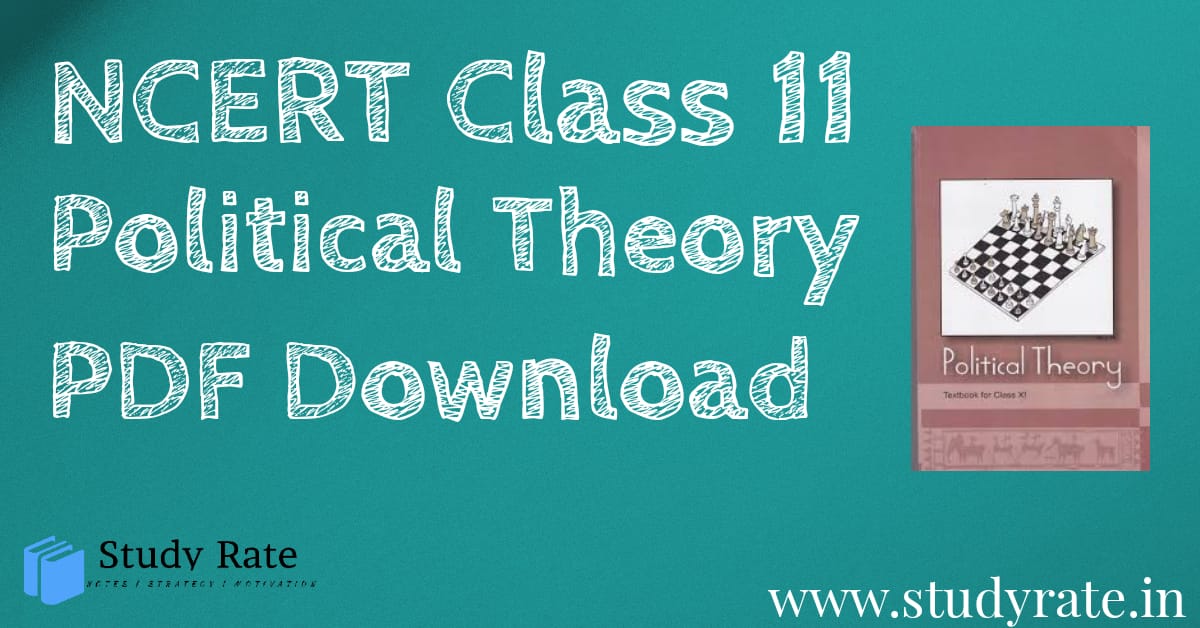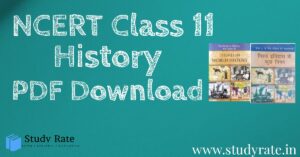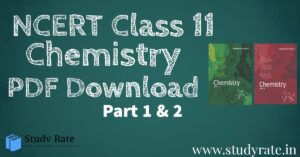The National Council of Educational Research and Training (NCERT) is an autonomous body entrusted with the responsibility of publishing textbooks such as the NCERT book for Class 1 Political Theory For the CBSE examination, students can adhere to the NCERT book of Political Theory Class 11 as it elucidates on all topics and concepts included in the CBSE syllabus. All necessary topics are also systematically covered in this book.
Join our Telegram Channel, there you will get various e-books for CBSE 2024 Boards exams for Class 9th, 10th, 11th, and 12th.
NCERT Books Class 11 Political Theory: The National Council of Educational Research and Training (NCERT) publishes Political Theory textbooks for Class 11. The NCERT Class 11th Political Theory textbooks are well known for it’s updated and thoroughly revised syllabus. The NCERT Political Theory Books are based on the latest exam pattern and CBSE syllabus.
NCERT keeps on updating the Political Theory books with the help of the latest question papers of each year. The Class 11 Political Theory books of NCERT are very well known for its presentation. The use of NCERT Books Class 11 Political Theory is not only suitable for studying the regular syllabus of various boards but it can also be useful for the candidates appearing for various competitive exams, Engineering Entrance Exams, and Olympiads.
NCERT Books Class 11 Political Theory PDF Download
| Class | 11th |
| Board | CBSE |
| Book | NCERT |
| Subject | Political Theory |
| Medium | English / Hindi |
| Study Materials | Free Study Materials Available |
| NCERT Political Theory | NCERT Political Theory Book Class 11 PDF Download |
NCERT Class 11 Political Theory Books are provided in PDF form so that students can access it at any time anywhere. Class 11 NCERT Political Theory Books are created by the best professors who are experts in Political Theory and have good knowledge in the subject.
NCERT Books for Class 11 Political Theory – English Medium
- Chapter 1 Political Theory: An Introduction
- Chapter 2 Freedom
- Chapter 3 Equality
- Chapter 4 Social Justice
- Chapter 5 Rights
- Chapter 6 Citizenship
- Chapter 7 Nationalism
- Chapter 8 Secularism
- Chapter 9 Peace
- Chapter 10 Development
NCERT Books for Class 11 Political Theory (Hindi Medium)
- Chapter 1 Political Theory: An Introduction
- Chapter 2 Freedom
- Chapter 3 Equality
- Chapter 4 Social Justice
- Chapter 5 Rights
- Chapter 6 Citizenship
- Chapter 7 Nationalism
- Chapter 8 Secularism
- Chapter 9 Peace
- Chapter 10 Development
NCERT Book for Political Theory PDF Free Download
Chapters of Political Theory Class 11 PDF
The exercise section, side comments, and suggestions for activities can help students to understand the associated concepts quickly. Additionally, the simple language and interactive nature of this political science political theory book of class 11 is an added advantage.
There are ten chapters in political theory NCERT book, and it covers a wide range of topics. It begins with an introduction to political theory, and then move on to discuss topics like freedom, equality, social justice, citizenship, peace, etc.
Students can quickly download political theory class 11 PDF from the given link.
Chapter 1- Political Theory: An Introduction
In the first chapter of NCERT class 11 political science political theory book, you get to know about political theory and its fundamentals. Political theory primarily deals with ideas and principles which influence governments, constitutions, and social life. Moreover, it clarifies concepts like freedom, equality, democracy, justice, etc.
Political theory analyse these concepts systematically. It focuses on the existing definition of these ideas provided by different political thinkers over the years. Additionally, It examines the extent of these concepts in daily life and different institutions. It also explains the meaning and importance of other ideas associated with the primary concepts mentioned above.
Chapter 2- Freedom
In this chapter of political theory class 11 NCERT book, you will study about various discussions regarding freedom. Additionally, this chapter also includes debates associated with freedom, which focuses on evolving the principles of freedom. It differentiates between restrictions and necessary constraints as well.
Apart from various principles, there are several debates associated with the concept of freedom, and you will study about such discussions in this chapter. Completing this chapter will enable you to appreciate the importance of independence for individuals as well as societies. You will also realise the difference between two different dimensions of freedom, i.e. negative and positive. Lastly, you understand the actual meaning of ‘harm principles’.
Chapter 3- Equality
This chapter of political theory class 11 PDF talks about the concept of equality. It is one of the core values of the Indian Constitution. This chapter discusses the following pointers –
- Definition of equality
- Why equality matters?
- Does equality mean treating everyone in similar ways under every condition?
- How to achieve equality and minimise inequality in different areas of life?
- How to differentiate between various sub-types (political, economic, and social) of equality?
Moreover, to answer these questions properly, you need to understand ideologies like Marxism, Socialism, Feminism, and Liberalism. There are some facts and figures mentioned in this chapter as well, but they are presented to emphasise the nature of inequality. You can choose not to memorise it.
Chapter 4- Social Justice
The concept of social justice stands for the fair and unbiased relationship between individuals and society. It is primarily measured by equal opportunities for individuals, distribution of wealth, and various social privileges.
In this chapter of political theory class 11 textbook, you will learn about different principles of justice, put in different societies, during different periods. You will also learn the meaning of distributive justice, and John Rawl’s theory of justice.
The exercise section can help you revise and clear your doubts.
Chapter 5- Rights
As a citizen of a democratic country, every Indian enjoys certain rights, and they are both political and civil. Apart from these existing right, individuals nowadays are claiming for new rights like the right to clean air, right to information, right to safe drinking water, etc. Such movements have altered the definition of rights to a certain extent. Nowadays, rights are no longer limited to political and civil rights; they have extended to social and personal rights as well.
In this chapter of political science book class 11 political theory, you will learn about such rights in detail. It begins with an introduction and origin of such rights and then moves forward to discuss different types of rights.
Chapter 6- Citizenship
The definition of citizenship is, it is a status provided by a sovereign nation, where that nation will recognise individuals as a member of that state. In this chapter of political theory book of class 11, you will study more on this topic.
The definition of citizenship is addressed in the first section of this chapter. After that, it moves on to discuss the debates and struggles surrounding the interpretation of this concept. In the following topic, you will read about the relationship between individuals and their country, along with the criteria of citizenship in various countries. Finally, in the last two sections of this chapter, you will study about the concept of global citizenship and its relevance.
Chapter 7- Nationalism
In the 7th chapter of political theory class 11 PDF, you get an opportunity to know more about nationalism. However, the purpose of this chapter is not to discuss the origin of this concept or its purpose. This chapter aims to assess nationalism carefully and help you to realise its aspirations and claims.
Hence, after finishing this chapter, you will understand the concept of nationalism, its strengths and limitations, and realise the need for a connection between nationalism and democracy.
In addition to all of these, there is a section where you will get a chance to understand Rabindranath Tagore’s idea of nationalism. Complete the following exercise to revise your learnings.
Chapter 8- Secularism
In the previous chapter, a question emerged, how can a democratic state ensure equality among different cultures and communities residing within its borders? This chapter of class 11 political science political theory book aims to provide an answer.
The answer is secularism. In this chapter, you will learn how secularism helps to maintain this balance in a democracy. However, there is an ongoing debate about secularism in this country, and it has an implication on the Indian society. In this chapter, you will study such contradictory ideas as well.
In a nutshell, this chapter of political theory aims to offer an in-depth analysis of secularism, and where it stands in the Indian society.
Chapter 9- Peace
In the modern-day world, the word peace has become very popular, as leaders of the states, media, and thinkers are always talking about it. Contrarily, actual peace has remained elusive. In this chapter of political theory class 11 PDF, you will learn about peace and its associated concepts in detail.
In the introduction section, you will learn how great thinkers have said about peace as a concept. In the second section, you learn the meaning of peace. The following section poses an important question, can violence promote peace? After that, you learn different approaches towards achieving peace, which is followed by contemporary challenges.
Chapter 10- Development
In this last chapter of NCERT books for class 11 political science political theory, you will learn about development, as a concept. Like every other chapter, this one also begins with an introduction and followed by the challenges to this concept.
After that, you study about various development models and the criticism they have received over the years. In the fourth and last section of this chapter, you learn about alternatives to development.
There are few ideas and notes attached to different sections of this chapter, study them carefully to understand this concept even better.







